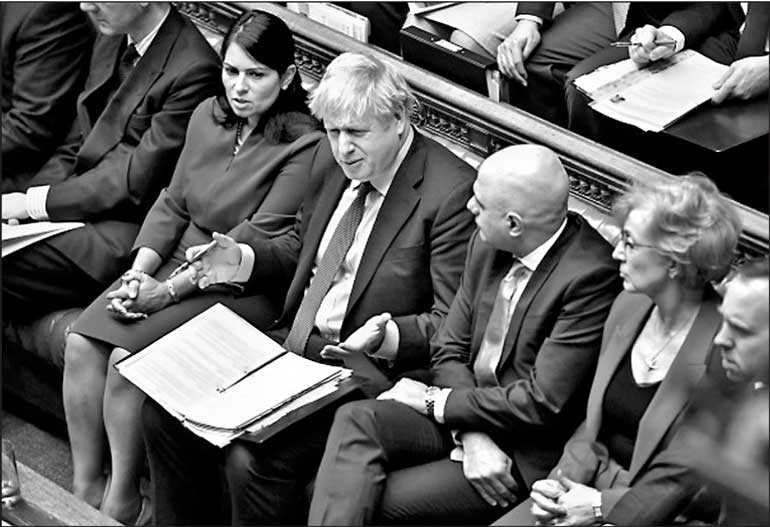Saturday Feb 21, 2026
Saturday Feb 21, 2026
Saturday, 15 February 2020 00:04 - - {{hitsCtrl.values.hits}}

Boris Johnson, Home Secretary Priti Patel and Chancellor of the Exchequer Sajid Javid attend the weekly question
time debate in Parliament in London, Britain, February 12, 2020 - Reuters
LONDON (Reuters): Boris Johnson forced the resignation of his finance minister on Thursday for refusing to toe the line, a sign the prime minister was tightening his control in a government reshuffle designed to deliver his vision for Britain beyond Brexit.
Johnson, who had wanted to minimise any disruption from his long-planned cabinet revamp, quickly replaced Sajid Javid with his deputy Rishi Sunak, a loyal supporter of the prime minister who is often put before the media to sell government policy.
Johnson’s team had carefully choreographed the reshuffle, presenting it as an opportunity to foster new talent, particularly among women, while also rewarding loyalists.
But the finance minister’s resignation – which some commentators said might have been sought by Johnson’s team all along – added to a sense that the prime minister would brook no dissent and wanted to have more control over the Treasury.
“Whilst I was very pleased that the prime minister wanted to reappoint me, I was unable to accept the conditions that he had attached so I felt I was left with no option but to resign,” Javid told reporters outside his house.
“The conditions that were attached was a requirement that I replace all my political advisers ... I was unable to accept those conditions, I don’t believe any self-respecting minister would accept such conditions.”
Johnson’s spokesman said the British leader had set up a new economic team to advise both the prime minister and finance minister so that the two could work closely together.
“It will be based in Number 10 and Number 11 (Downing Street) and will jointly advise the prime minister and the Chancellor of the Exchequer as they work to level up the economy across the UK,” the spokesman said, adding that Sunak had worked closely with his predecessor on the budget due in March.
“Excellent choice”
Sunak, a former Goldman Sachs banker who is married to the daughter of an Indian billionaire, is seen by many Conservatives as a safe pair of hands who will easily get on board with Johnson’s agenda for a post-Brexit Britain.
David Jones, a former Brexit minister, described Sunak as “very bright” and an “excellent choice”.
The pound and bond yields rose on the expectation that Sunak’s appointment would pave the way for a more expansionary budget.
Johnson has promised to reduce the wealth and opportunity gap between parts of Britain by channelling investment into northern and central England, where he won the votes of many traditional supporters of the main opposition Labour Party.
Johnson had not been expected to change the biggest-hitting posts in his government. But the changes he did make offered some insight into how he wanted to tighten his grip on power.
His sacking of Northern Ireland minister Julian Smith, who only a month ago had helped broker the restoration of a government in the British province, prompted criticism from politicians north and south of the border with Ireland.
Smith, who had been in charge of parliamentary discipline for Johnson’s predecessor, Theresa May, was the first minister to lose his job in the reshuffle. He was joined by others including business minister Andrea Leadsom and environment minister Theresa Villiers.
Ultra-loyal Alok Sharma, a former minister for international development, was appointed as the new minister for business and also the head of the COP26 climate change summit in Scotland in November, due to be attended by world leaders.
Anne-Marie Trevelyan was promoted to minister for international development, while other big departments – such as foreign, home affairs, trade and health – kept their ministers. Former Brexit minister Stephen Barclay took Sunak’s old role.
It was Javid’s move which shook up the ‘business as usual’ look that Johnson had wanted to portray.
Downing Street aides had previously played down suggestions, based on Johnson’s senior adviser Dominic Cummings’ well-publicised desire to see a radical reorganisation of government, that there would be major changes.
But it was clear that loyalty mattered to Johnson to be able to deliver his agenda and meet the promises he made in the run-up to the 12 December election, in which he won a large majority.
Opposition politicians said Javid’s resignation had shown the reshuffle to be a mess.
“This is a historical record. A government in chaos within weeks of an election,” said John McDonnell, Labour’s finance spokesman.